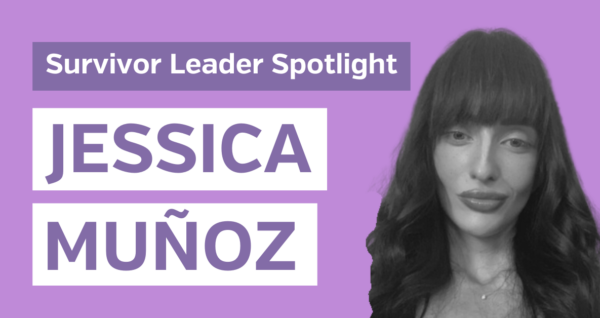This Domestic Violence Awareness Month (DVAM), we’re spotlighting some of our incredible Survivor Leaders, former clients of Sanctuary who go through a 12-week training and certification course to prepare them to make system-wide change through advocacy, training, program development, and working directly with other survivors.
Fellow Survivor Leader Jennifer Cortes sat down with Jessica to discuss her advocacy work and more.
Survivor leadership is an essential aspect of Sanctuary’s work. Can you describe how survivor-led initiatives or programs have made a difference in the fight against domestic violence?
Survivor leadership is essentially valuing lived experience. Lived experience of gender-based violence is cultural expertise. Identifying as a survivor is part of my cultural identity. Furthermore, there are nuances to the survivor’s cultural identity that add vital expertise, for example being a first-generation immigrant, or an Afro-Latina. Gender identity can add to cultural expertise. Cultural identity is a complex thing: I am a first-generation immigrant who spent all of my adult years in West Harlem in little Santo Domingo far away from my home country’s culture. Cultural identity moves beyond race and country of origin. The bittersweet thing about intimate partner violence is that it cuts across all cultures, and the sweet thing is survivor leadership brings people together from all identities.
Survivor leadership harnesses lived experience and cultural expertise to make systemic change. Systemic change happens by giving survivors voices and telling them “you belong here”. That means recognition and remuneration of lived experience. This has been happening for years in substance abuse circles, where peer leadership has long been the norm and part of the treatment team. Trauma-informed care has not embraced peer leadership, and this needs to change. Stigmatization of survivors sadly remains strong. Survivors are not forever damaged. In fact, we have unique and transferable skills. Making space for us at the table alongside organizational leaders, board members, and decision makers is vital.
As survivor leaders at Sanctuary we pride ourselves on being present on the ground at grass roots events such as Brides March. We are inside the shelters face to face with survivors, inside courts supporting survivors. But, we are also in meetings discussing policy with board members who are hospital leaders, partners in big law, former judges, foundations, staff attorneys, and much more.
“The bittersweet thing about intimate partner violence is that it cuts across all cultures, and the sweet thing is survivor leadership brings people together from all identities.”
Can you tell me about some recent advocacy work you’ve been involved in, and which moments have been the most impactful to you?
Speaking at Denim Day in Foley Square was powerful for me. I discussed sexual assault in the setting of intimate partner violence, and I experienced the privilege so many are denied: being given a voice and feeling like my story matters. There are so many hidden stories out there and no one survivor story is more important than another.

How has your experience as a survivor influenced your approach to supporting others who have experienced gender violence?
There are not enough days in the week. Never enough time. That is why survivor leadership needs to be financially compensated so it may remain sustainable. Domestic violence is an everyone problem, not a survivor problem. Survivors are already weighed down by the retraumatization of going through systems. We need your support.
In your opinion, what are some of the most significant barriers or misconceptions that still exist when it comes to addressing domestic violence?
I am disheartened by some of the #narcissticabuse content I see on my social media feed recently. Some of the accounts are ran by “recovering narcissistic abusers”offering their past lives as abusers to school people. Or there are opportunists out there looking to make a buck from content on coercive control. They are predators with neither lived experience nor professional expertise in my opinion. I want to bring the conversation back to what is at the center of abuse and that is coercive control. Narcissism is in fact a difficult to diagnose personality disorder. When we focus on narcissistic traits, we move away from what is at the center of gender-based violence, and that is CONTROL. Additionally, I want to alert everyone that the best resource for dealing with intimate partner violence is a multidisciplinary organization that offers free services from a team of experts in the field. An example of this is Sanctuary for Families where there are family law attorneys, immigration attorneys, attorneys specializing in matrimonial law, and mental health therapists all of whom are licensed professionals. We also have a shelter and of course survivor leaders who are advocates. These are the real people doing the real work, who will tell it like it is and provide menu options to build a pathway to safety.
What are some ways that people can get involved or support survivors throughout DVAM and beyond?
Follow Sanctuary for Families on IG (@sffny)! Give the not-for-profits who have been doing the real work support. The mere act of following can help increase their online presence, which can contribute to their fundraising efforts. Follow #DVAM hashtags and post, talk and discuss coercive control/ domestic violence. Let’s remember to talk about the emotional and psychological abuse, not just the physical abuse. In my experience, emotional and psychological abuse leaves the deepest scars.
Is there a particular message or call to action you’d like to convey in honor of DVAM?
I want to draw attention to an awesome program I’ve been privileged to be part of as a survivor leader: trauma informed strength training, with Strength is MINE. Check them out on IG (@infostrengthismine).
Engaging in weightlifting within the traditionally masculine gym environment is a deeply ingrained and celebrated societal practice. In a landscape where patriarchy forms the foundational backdrop of gender-based violence, the powerful act of a survivor stepping into a gym, asserting their presence, and witnessing fellow gym-goers willingly adjust to accommodate their needs conveys a resounding message: “I belong here.” This experience holds immeasurable importance for oppressed survivors of gender violence. Furthermore, it is imperative to acknowledge that gender-based violence is a societal issue that extends far beyond the burden placed upon survivors; it is a pervasive problem that implicates everyone. Implementing trauma-informed therapies within commonplace community settings, such as fitness facilities, offers an appealing and easily accessible approach. The inclusion of survivor healing within everyday spaces, alongside the broader community, contributes to destigmatizing the survivor experience. Depicting survivors as exemplars of strength serves as a poignant reminder of their transformation from individuals previously perceived as damaged. This influences both survivors’ self-perception and the broader societal perspective.
I have particularly enjoyed my relationship with my strength-training coach (@ironstrongfit), who is a mentor: her energy personifies empowerment and kindness. For an hour I am fully present and connected with my body while feeling psychologically and physically safe. This is extremely powerful for me and has been equally as profound as attending talk therapy, if not more. I also want to shout out Ediva owner and instructor at GRIT boxing who has delivered trauma-informed boxing classes. We loved boxing with Ediva. Providing a trauma-informed space for survivors to experience a somatic intervention that addresses body connectedness is everything!
Support funding for further research to consolidate somatic interventions as primary therapies. Follow me on IG (@jmunozpsychotherapy) to learn more.

Join Jessica in standing with survivors of gender violence. Your gift supports Sanctuary’s life-saving work with thousands of families escaping abuse.
